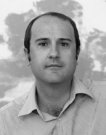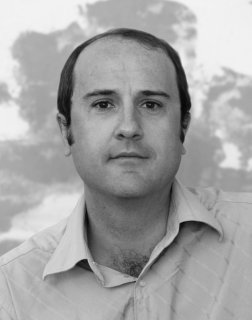AUSTRALIAN POETS AT WORK SERIES 2
David Musgrave
Selected by Coral Hull

[Above] Photo of David Musgrave by James Ostinga, year unknown.
CH: Why is poetry important to you?
DM: Poetry is not just the cognac of literature, it’s the bee's knees, the duck’s nuts and the termite’s trousers. Poetry is language at the speed of thought, according to Joseph Brodsky – if people are too busy grasping at material things and still want to appear smart – then they should buy and read poetry! It’s cheap, quick and effective! I live poetry because it is the most immediate way of knowing that I know of. More people write poetry in Australia than any other literary form and, because of that, I think that it is likely to become Australia’s dominant literary art form, if it isn’t already. We are in the middle of a golden age of Australian poetry at the moment, and I want to see this recognised both within Australia and beyond its borders.
CH: What makes you happy?
DM: This is the hardest of all your questions. ‘Nothing’ is one answer, ‘everything’ another.
CH: What is your favourite season and why?
DM: Autumn, although I once had a conversation with Les Murray in which he said there were really about 10 seasons in Australia, so what I call autumn is obviously an inauthentic category. Not knowing all ten names of Les’s categories, I’ll have to settle for: Sydney between March and May. Why? The days are hot enough to swim and the nights are cold enough to snuggle.
CH: What is your most memorable childhood incident?
DM: Finding myself in hospital, aged twenty months, and not understanding why my mother was leaving me there. Finding the other children very big and, despite my fear of them, wanting to watch television with them (from my cot) and asserting that desire most indecisively. Finding lego not a very satisfactory substitute for a mother. Being terrified of ceilings. Understanding most things said but not all. Panicking.
CH: Do you believe in life after death?
DM: I’m not sure if I believe in life before death. I’m not sure what life is, so I don’t know if it is something which can persist. Having said that, I recognise (and mourn) its absence in others and expect to inflict the same disorientation on others when I croak.
CH: What are your primary concerns regarding the world?
DM: The fact that western/bourgeois lifestyles are unsustainable and that our whole mode of being, at the moment, cannot continue. I worry about the disappearance of species, the lack of water, abundance of dust, rising sea levels, homeless Kiribatians, dispossessed coastal retirees, etc ... I am concerned that the capitalist model may simply not be adequate to meet these needs and that our future may be more anarchic, violent and brutal than we would care to contemplate. I am especially irritated by politicians at the moment who pretend that the issue is blown out of all proportion – there is nothing as short-sighted as political expedience. I am also extremely irritated by the education we are dishing out to our children – it is simply crap. And every time I see someone drive past in a CVU/5UV whatever, I wish I had that rocket launcher from Doom so that I could make the world a better place. Now that I’ve started, it’s hard to stop ...
CH: Who are your favourite Australian poets and why?
DM: Francis Webb: all round greatness, vision, diction, technique; Kenneth Slessor: his best five poems are amongst the best of all Australian poems; Banjo Paterson: fantastic metrical control, unequalled by anyone writing in Australia since; Les Murray, pre-1986. Late Rosemary Dobson. John Forbes: Australia’s Andrew Marvell? A great ‘thinker while in the throes of writing’; David Campbell: a great, understated poet, really deft and sensitive. Fay Zwicky: her voice is unique and to die for. Modesty forbids me mentioning the poets published by Puncher & Wattmann, all of whose work I adore, otherwise I wouldn’t bother with it; John Tranter because he did what other poets couldn’t or wouldn’t; Michael Sharkey – he just keeps getting better and better; Ern Malley – cutting sick, eh?; Kerry Swift – a young poet who is coming through and is the real thing; Meredith Wattison – a unique voice who is already there; John Blight – because he did one thing extremely well. Is that enough?
CH: If you could do lunch with anyone who would it be?
DM: Paul Muldoon. He is the most important poet writing in English at the moment. He had the best teacher possible and now he has the best audience available. I’d like to ask him about some of his structuring techniques, his rhymes, his personae, his life, whatever… what the hell, I think he sounds like a nice bloke, we’d probably have a whale of a time.
| |
Billabong
We came across a billabong
steeped in shadow at the long end of the day:
a black tannin mirror with a khaki stain
of furry tree-bones and bark. Dark oolong
depths disappeared under a scummed
moire of willows
and cool oblongs
of sunlight schooled the shallows.
Day-old dragonflies drummed
the stagnant surface and then zagged away.
Black ducks drifted. Overhead a currawong
shifted along a branch like a shy ninja,
as if trying not to belong
to the twitching dusk, and you said,
"this is the kind of light that's perfect
for making photographs. Look," and you pointed
to a soft patch of light in the pallid gloom
where the gums were peeling ginger
bark into water and a tangle
of curling branches interlocked
like broken ribcages. Cocked
on one leg bent and then the other, you waited
for the perfect angle,
like right from wrong
to emerge somehow - and captured the zoom
of two dragonflies as they zigged into view,
coupled in an intricate heart shape. They skimmed
the surface a while then disappeared. For a few
last minutes the sun's long
rays tilted into a shallow abyss of dark wet fire.
Ribs of light
rose up a dark trunk,
breathing towards scant birds
in its branches. The world dimmed.
We picked our way back through turds
of thirsty animals towards the highway
where poplars shrivelled
into the violet loom
of dusk and the road plunged over the river,
spreading around the dark rooms
of the town flickering into night.
Whales, Head of Bight
Upturned valleys or hulls
the colour of gun-metal
disappear in white flowers,
green tents bedded with petals,
basking snore-ends lolling
through spume banks for hours
on end, spy-hopping, rolling,
saluting the circling gulls
with flipper-toast wave breaches
and, sinking once more in mist-sighs
resume a cruising shoal
never at ease, a capsized
squadron still on patrol
while on their backs wet sunlight
burns in a dark-timbered blaze.
The Dead
For my father
He has come back.
He has come from outside himself to assume
the proportions of dream, in a city of symbols falling
from deliverance, offered up to speech.
He mouths voiceless vowels, but cannot settle
in the complex room with unwashed windows
and sparse light in starfish and jellyfish shapes,
moving between moments. He is the sovereign
of helpless beauty, full of advice and all
dressed up with nowhere to go. Tears are not
required, there is not long, there is no need
for reassurance. Pigeons scrape the eaves.
He moves about restlessly, smiling
as if he had given himself over
to the sea or the lobes of harbour underlapping
the sky. Books are of no consequence,
he can no longer read. He understands
the weather and is interested in me.
Nights come by, from time to time, but mostly
days with a hard yellowness fix themselves
in his eye. He wears the clothes of a family
man and has no need for food. He needs
only a little time, enough for love.
He only wants to talk.
Wollomombi Falls
Vertigo begins in the groin:
which is why space carries on below us
in empty strides, we the umbilical
astronauts tumbling up in blue.
From the bottom of the gorge, a thin roar
of falling water tempts us with the knowledge
you can fall only once.
The fence resists temptation: it's a scar
of woven metal. Some birds descant
from open beaks above the plunging silence.
The trees are tentative, leaking wind:
I remember balancing on the edge
of puberty and thinking, the future sprouts
from scars like these. A mirror
flings a present at the future.
Something as rare as forgiveness in scrabble
happens from time to time: twenty, thirty
years ago a dog fell down this gorge
and survived with only a broken leg.
I think about survival, like the chartreuse-
coloured lichen on the northern side of tree trunks:
I'd thought myself immune to the sublime
having bounced off a tightrope once and survived. |
About the Poet David Musgrave

|
David Musgrave was born in 1965 in Sydney. He studied at Sydney University where was awarded a PhD in literature in 1997. He has continued to write prose as well as poetry and has published articles on Australian and European literature. His list of awards and prizes includes the Bruce Dawe Poetry Prize, the Broadway Poetry Prize, the Sidney Nolan Gallery Poetry Prize and the Henry Lawson Poetry Prize. He was awarded an Australian Society of Authors Mentorship in 2001 and an Emerging Writer's grant from the Australia Council in 2002. David is currently working on a collection of poems, titled Bodies of Water, in collaboration with his wife, photographer Fiona Robards, as well as another book gathering his poems from the last four years. In 2005 he started the publishing house Puncher & Wattmann, which publishes contemporary Australian poetry and prose. His work has been published in numerous magazines and anthologies in Australia. He is currently the Treasurer for the Poets Union Inc and cites his influences as Paul Muldoon, Elizabeth Bishop, Joseph Brodsky, Francis Webb, Seamus Heaney, John Ashbery, Fernando Pessoa, Marina Tsvetaeva and Pablo Neruda. |
[Above] Photo of David Musgrave by James Ostinga, year unknown.
I Next I
Back I
Exit I
Thylazine No.12 (June, 2007) |



